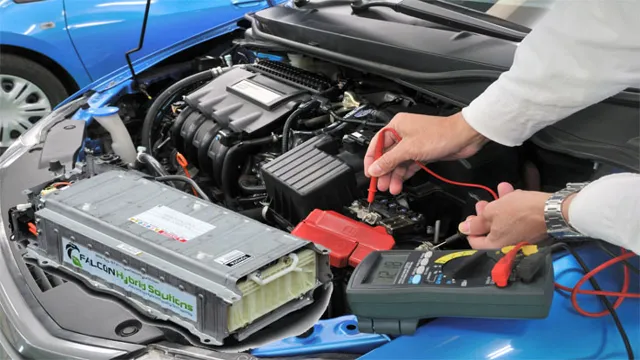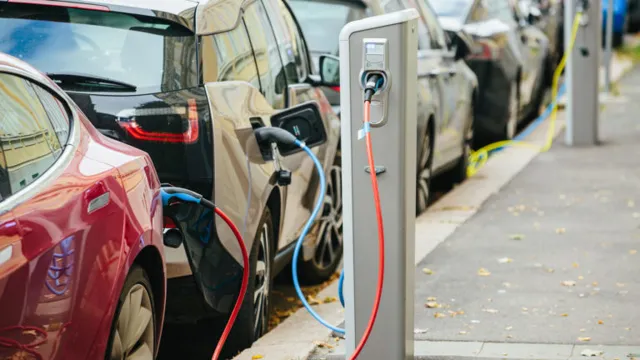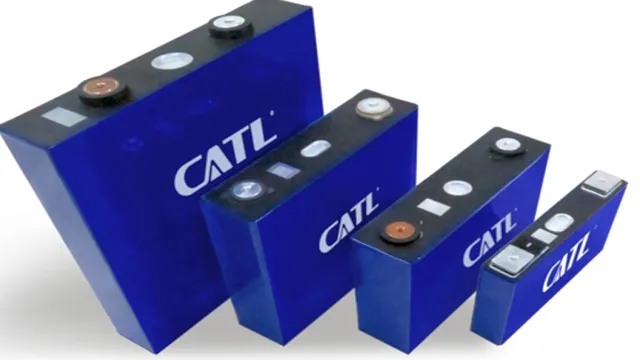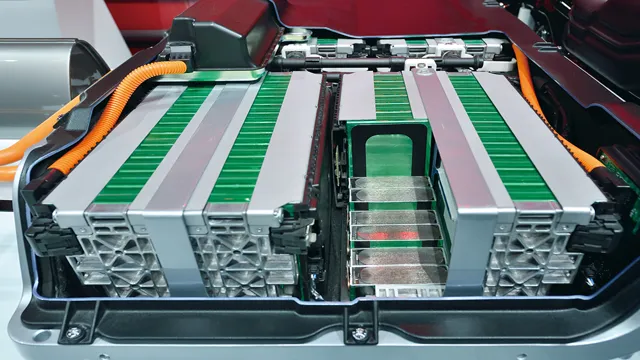Unleashing the Power of Peace of Mind: Understanding Electric Car Battery Warranty
Electric car batteries are quickly becoming the go-to source of power in the automotive world. They offer a cleaner and more sustainable alternative to traditional gasoline engines. However, like any other mechanical device, they can fail, and most companies provide a warranty to protect the consumer from such issues.
But what is an electric car battery warranty, and how does it work? Many factors need to be considered when selecting the best warrant for your EV battery. This blog will provide insight into the world of EV battery warranties and help you learn the best way to protect your investment.
Overview
When it comes to purchasing an electric car, one of the important factors to consider is the battery warranty. In most cases, electric vehicles come with warranties that cover the battery for several years. This warranty typically includes protection against any defects or performance issues that may arise during the given period.
However, it is important to understand that the warranty for the battery may vary depending on the manufacturer and the model of the electric vehicle. Some manufacturers offer longer battery warranties while others offer shorter warranties. It is also important to consider the details of the warranty such as the mileage and the conditions under which the warranty is void.
Understanding the battery warranty for your electric car will help you make an informed decision when you are considering purchasing an electric vehicle.
Importance of Battery Warranty
Having a warranty for your battery is incredibly important as it ensures that you are protected against any defects or malfunctions that may occur during the lifespan of the battery. Whether you are using a battery for your car or your phone, warranties provide a safety net that can save you a lot of money and hassle in the long run. When investing in a new battery, it is important to make sure that the warranty covers all aspects of the battery, including its durability, performance, and quality.
The last thing you want is to be stuck with a faulty battery and no warranty to get it fixed or replaced. Therefore, always read the terms and conditions of the warranty carefully before making a purchase. Remember, a good warranty can provide peace of mind and ultimately save you a lot of time and money down the road.
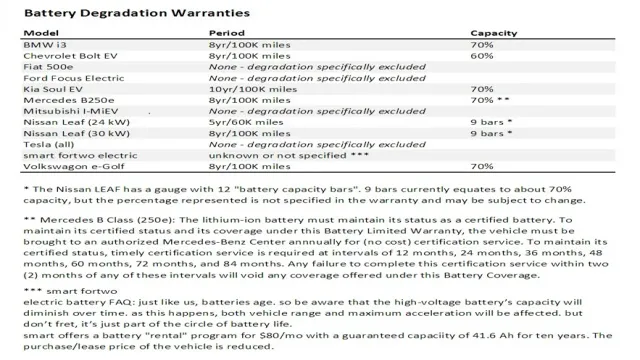
Factors that Affect Battery Life
Battery life is a crucial factor to consider when buying any electronic device that runs on batteries. Several factors determine how long a battery lasts, but the most important ones are the type of battery, the device’s usage pattern, and the environment in which it operates. The type of battery is an essential element affecting its life since the technology behind it and the chemical reactions taking place within the cell determine how it charges and discharges.
Moreover, the usage pattern of the device, such as the brightness level, connectivity features, and screen time, also influences the battery life. Lastly, the environment in which the device operates also profoundly impacts the battery life. For instance, extreme temperatures, humidity, or exposure to direct sunlight detrimentally affect the battery.
By considering these factors and taking proper care of the battery, users can maximize the battery life and ensure that their devices continue to function correctly and last for a long time.
Types of Battery Warranties
When purchasing an electric car, one of the most important things to consider is the battery warranty. There are different types of battery warranties offered by different manufacturers, each with its own coverage and limitations. Some manufacturers offer warranties based on time or mileage, while others may offer a combination of both.
Some warranties cover only manufacturing defects, while others may cover normal wear and tear as well. It’s important to read the fine print and understand exactly what is covered under the warranty before making a purchase. With a good battery warranty for electric cars, you can have peace of mind knowing that you’re protected if anything goes wrong with your vehicle’s battery.
Manufacturer Warranty
When purchasing a new battery, it’s important to understand the type of warranty that comes with it. There are a few different types of battery warranties that manufacturers may offer. The first is a full replacement warranty, which means that if the battery fails within a certain timeframe, typically a few years, the manufacturer will replace it completely free of charge.
Another type is a pro-rated warranty, which means that the battery will be replaced at a discounted price based on the amount of time it has been in use. Some manufacturers also offer a limited warranty, which covers only specific defects or issues with the battery. It’s important to carefully read and understand the terms of any battery warranty before making a purchase, as these can vary widely between manufacturers.
By understanding the different types of battery warranties available, consumers can make informed decisions about which battery to purchase based on their specific needs and preferences.
Extended Warranty
An extended warranty is a great way to protect your investment and give you peace of mind. When it comes to batteries, there are different types of warranties that you should be aware of. The most common type of battery warranty is a “limited warranty,” which typically covers defects in materials and workmanship.
This means that if there is a problem with the battery because of something that it was made with or how it was put together, the warranty will cover it. Other types of battery warranties include “pro-rated warranties” and “replacement warranties.” With a pro-rated warranty, the amount of coverage decreases over time.
With a replacement warranty, the warranty will replace the battery with a new one if it fails within a certain time frame. It’s important to read the fine print when it comes to warranties so that you know exactly what is covered and what is not.
What to Look for in a Battery Warranty
When shopping for an electric car, one important factor to consider is the battery warranty. A good battery warranty provides peace of mind and financial protection in case of unexpected issues. When researching battery warranties, be sure to focus on the terms and conditions.
Some warranties may have mileage limits or require specific maintenance schedules to remain valid. It’s also important to look for a warranty that covers both factory defects and normal wear and tear. Keep in mind that a longer warranty isn’t always better if it comes with restrictive terms.
Look for a warranty that best suits your needs based on your driving habits and how long you plan to keep the car. Overall, a comprehensive and flexible battery warranty can be a valuable investment in your electric car.
Duration and Coverage
When purchasing a battery, it’s important to consider the duration and coverage included in the warranty. The duration of the warranty refers to how long the manufacturer will stand behind their product. Generally, a longer warranty means that the manufacturer has confidence in their battery’s longevity.
In addition to the duration, it’s also important to look at what’s covered under the warranty. Some warranties cover defects in workmanship or materials, while others may cover damage from normal use. It’s important to read the fine print and understand what’s included in the coverage.
Keep in mind that a warranty is only as good as the company behind it, so be sure to research the manufacturer’s reputation before making a purchase. By considering both the duration and coverage of a battery warranty, you can make a more informed decision and feel confident in your purchase.
Exclusions and Exceptions
When it comes to choosing a battery, the warranty can be a crucial factor to consider. While warranties may vary depending on the type and brand of the battery, there are a few things you should look for. Firstly, check for any exclusions or exceptions in the warranty, such as non-covered damages and replacement conditions.
Understanding these details can help you determine what is covered and what isn’t in case something goes wrong. Secondly, look out for the length of the warranty. Most batteries have a warranty that lasts up to 3-5 years.
The longer the warranty, the more confidence the manufacturer has in their product. Finally, check the warranty’s transferability. This may not seem important at first, but it can come in handy if you plan on selling your vehicle or battery in the future.
By considering these factors, you can choose a battery that not only suits your needs but also offers you peace of mind.
Maximizing Your Battery Warranty
When it comes to purchasing an electric car, one of the notable advantages is its battery warranty. Understanding how to maximize your battery warranty is essential to ensure that you get the most out of your electric vehicle. Manufacturers offer varying warranty periods, but it usually covers between 8 to 10 years or a prescribed mileage limit.
It’s important to follow the manufacturer’s recommended maintenance schedule, charge the battery appropriately to prevent overheating, minimize fast charging as much as possible, and keep your battery at around 50% capacity when not in use for extended periods. Doing so will help prolong the life of your battery, maintain its efficiency, and protect it from degradation. Regularly monitoring your vehicle’s battery health through the onboard system can also help you identify any issues before they become more significant problems.
By taking proactive steps to care for your electric car’s battery, you can ensure that you get the most out of it while remaining covered by the manufacturer’s warranty.
Maintenance and Care
Maximizing Your Battery Warranty When it comes to maximizing the warranty of your battery, proper maintenance and care are essential. One of the most important things you can do is ensure that your battery is charged regularly. This means using the charger that came with your device and avoiding overcharging, which can damage the battery.
You should also keep your battery clean and dry, and avoid exposing it to extreme temperatures. In addition, it’s important to avoid completely draining your battery before recharging it. By taking these simple steps, you can ensure that your battery lasts as long as possible and that you get the most out of your warranty.
Charging Habits
When it comes to maximizing your battery warranty, your charging habits play a significant role. It’s important to keep in mind that constantly charging your device to 100% can actually harm your battery in the long run. It’s recommended to keep your battery between 20% and 80% for optimal health and longevity.
Additionally, using a low-quality charger can also damage your battery and shorten its lifespan. It’s best to invest in a high-quality, manufacturer-approved charger to ensure the longevity of your battery. Another tip to keep in mind is to avoid exposing your device to extreme temperatures while charging, as this can also harm your battery.
By implementing these charging habits, you can ensure that your battery lasts as long as possible and maximize your warranty.
Final Thoughts
In the world of electric cars, the battery warranty is a crucial factor to consider before making a purchase. It’s essential to understand that the battery is the most expensive component of an electric vehicle, and its lifespan can significantly impact the car’s overall cost of ownership. Most manufacturers offer battery warranties for anywhere between 8 and 10 years, with certain models exceeding that range.
Additionally, warranties have different coverage levels, ranging from full replacement coverage to ones with prorated coverage. However, it’s also crucial to recognize that battery lifespan can vary based on factors such as driving habits, temperature, and charging patterns. Ultimately, it’s crucial to research and understand the battery warranty of any electric car you’re considering to make an informed decision and ensure you have a stress-free ownership experience.
Conclusion
In essence, a battery warranty for an electric car is a bit like a relationship. It’s a commitment that provides peace of mind, but like all relationships, it can come with its own set of challenges. Just like how a couple might work through their differences to keep their love strong, an electric car owner should do their part in maintaining their battery by following proper charging and storage guidelines.
With some TLC, an electric car battery warranty can be a bond that is built to last.”
FAQs
What is the typical warranty period for an electric car battery?
The typical warranty period for an electric car battery is around 8 years or 100,000 miles, whichever comes first.
Do all electric car manufacturers offer a warranty for their batteries?
Yes, almost all electric car manufacturers offer a warranty for their batteries. The warranty period and coverage may vary between manufacturers.
What does the battery warranty for an electric car typically cover?
The battery warranty for an electric car typically covers defects in materials or workmanship, and a reduction in battery capacity below a certain level within the warranty period.
Can the battery warranty for an electric car be extended?
Yes, some electric car manufacturers offer options to extend the battery warranty beyond the standard warranty period for an additional cost. It is important to check with the manufacturer for specific details on extended warranty options.

